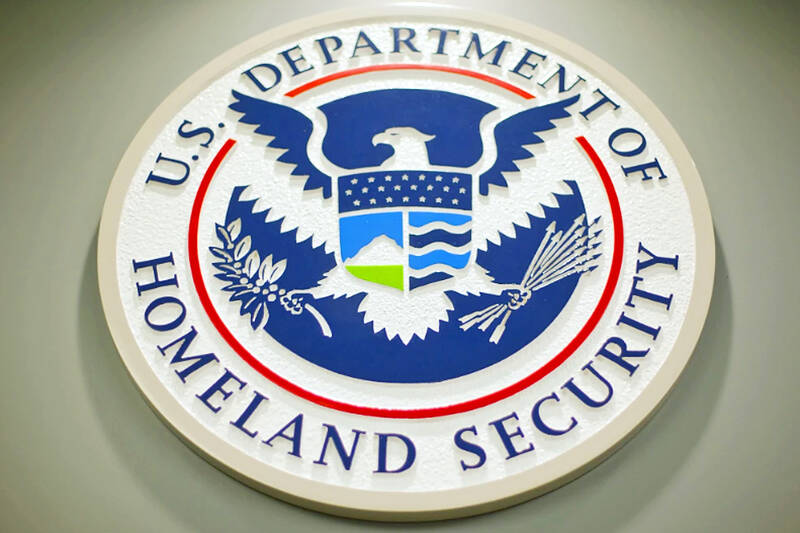The US Department of Homeland Security on Wednesday announced that it would ban the import of goods from a Chinese steel manufacturer and a Chinese maker of artificial sweetener, accusing both of being involved in the use of forced labor in China’s western Xinjiang region.
The action broadens the scope of the US effort to counter products from entering the country that the government says are tied to human rights abuses.
The additions to the entity list under the US Uyghur Forced Labor Prevention Act marks the first time a China-based steel company or aspartame sweetener business have been targeted by US law enforcement, the department said.

Photo: AP
“Today’s actions reaffirm our commitment to eliminating forced labor from US supply chains and upholding our values of human rights for all,” US Undersecretary of Homeland Security for Policy Robert Silvers said.
“No sector is off-limits. We will continue to identify entities across industries and hold accountable those who seek to profit from exploitation and abuse,” he said.
The federal law that US President Joe Biden signed at the end of 2021 followed allegations of human rights abuses by Beijing against members of the ethnic Uighur group and other Muslim minorities in Xinjiang.
The Chinese government has denied the accusations.
The new approach marked a shift in the US trade relationship with China to increasingly take into account national security and human rights.
Beijing has accused the US of using human rights as a pretext to suppress China’s economic growth.
Enforcement of the law initially targeted solar products, tomatoes, cotton and apparel, but over the past several months, the US government has identified new sectors for enforcement, including aluminum and seafood.
“That’s just a reflection of the fact that sadly, forced labor continues to taint all too many supply chains,” Silvers told a trade group in June when marking the two-year anniversary of the creation of the entity list. “So our enforcement net has actually been quite wide from an industry-sector perspective.”

MORE VISITORS: The Tourism Administration said that it is seeing positive prospects in its efforts to expand the tourism market in North America and Europe Taiwan has been ranked as the cheapest place in the world to travel to this year, based on a list recommended by NerdWallet. The San Francisco-based personal finance company said that Taiwan topped the list of 16 nations it chose for budget travelers because US tourists do not need visas and travelers can easily have a good meal for less than US$10. A bus ride in Taipei costs just under US$0.50, while subway rides start at US$0.60, the firm said, adding that public transportation in Taiwan is easy to navigate. The firm also called Taiwan a “food lover’s paradise,” citing inexpensive breakfast stalls

TRADE: A mandatory declaration of origin for manufactured goods bound for the US is to take effect on May 7 to block China from exploiting Taiwan’s trade channels All products manufactured in Taiwan and exported to the US must include a signed declaration of origin starting on May 7, the Bureau of Foreign Trade announced yesterday. US President Donald Trump on April 2 imposed a 32 percent tariff on imports from Taiwan, but one week later announced a 90-day pause on its implementation. However, a universal 10 percent tariff was immediately applied to most imports from around the world. On April 12, the Trump administration further exempted computers, smartphones and semiconductors from the new tariffs. In response, President William Lai’s (賴清德) administration has introduced a series of countermeasures to support affected

CROSS-STRAIT: The vast majority of Taiwanese support maintaining the ‘status quo,’ while concern is rising about Beijing’s influence operations More than eight out of 10 Taiwanese reject Beijing’s “one country, two systems” framework for cross-strait relations, according to a survey released by the Mainland Affairs Council (MAC) on Thursday. The MAC’s latest quarterly survey found that 84.4 percent of respondents opposed Beijing’s “one country, two systems” formula for handling cross-strait relations — a figure consistent with past polling. Over the past three years, opposition to the framework has remained high, ranging from a low of 83.6 percent in April 2023 to a peak of 89.6 percent in April last year. In the most recent poll, 82.5 percent also rejected China’s

PLUGGING HOLES: The amendments would bring the legislation in line with systems found in other countries such as Japan and the US, Legislator Chen Kuan-ting said Democratic Progressive Party (DPP) Legislator Chen Kuan-ting (陳冠廷) has proposed amending national security legislation amid a spate of espionage cases. Potential gaps in security vetting procedures for personnel with access to sensitive information prompted him to propose the amendments, which would introduce changes to Article 14 of the Classified National Security Information Protection Act (國家機密保護法), Chen said yesterday. The proposal, which aims to enhance interagency vetting procedures and reduce the risk of classified information leaks, would establish a comprehensive security clearance system in Taiwan, he said. The amendment would require character and loyalty checks for civil servants and intelligence personnel prior to